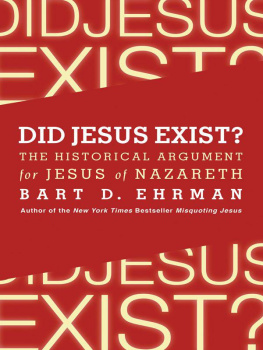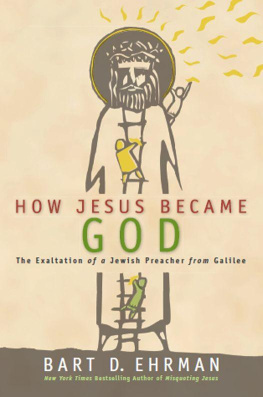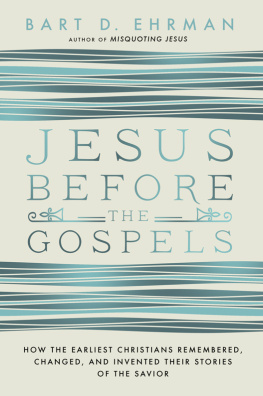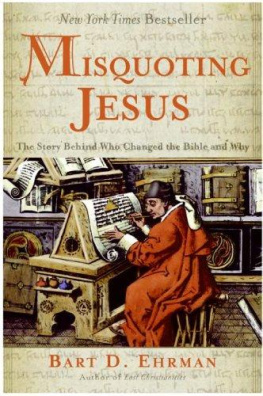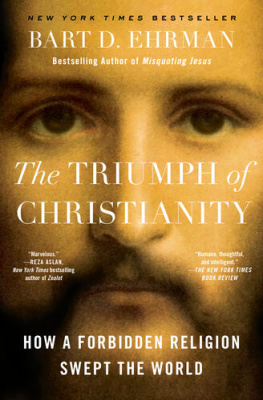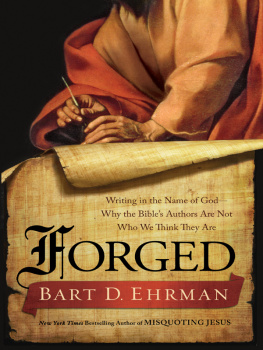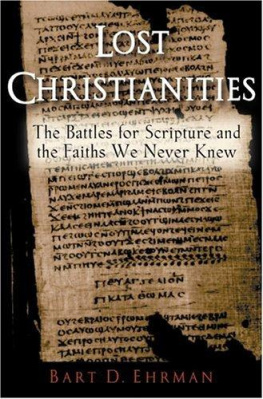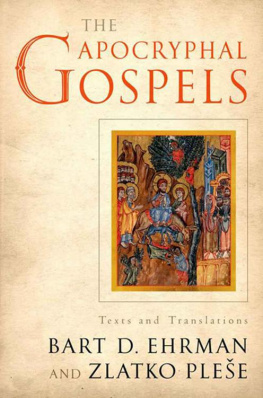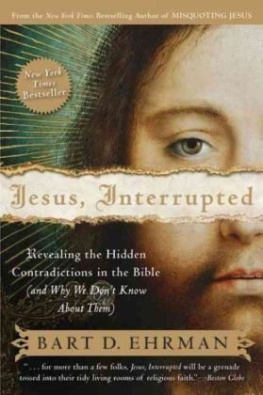FORGERY AND COUNTERFORGERY
FORGERY
and
COUNTERFORGERY
The Use of Literary Deceit in Early Christian Polemics

BART D. EHRMAN


Oxford University Press is a department of the University of Oxford.
It furthers the Universitys objective of excellence in research,
scholarship, and education by publishing worldwide.
Oxford New York
Auckland Cape Town Dar es Salaam Hong Kong Karachi
Kuala Lumpur Madrid Melbourne Mexico City Nairobi
New Delhi Shanghai Taipei Toronto
With offices in
Argentina Austria Brazil Chile Czech Republic France Greece
Guatemala Hungary Italy Japan Poland Portugal Singapore
South Korea Switzerland Thailand Turkey Ukraine Vietnam
Oxford is a registered trademark of Oxford University Press
in the UK and certain other countries.
Published in the United States of America by
Oxford University Press
198 Madison Avenue, New York, NY 10016
Oxford University Press 2013
All rights reserved. No part of this publication may be reproduced,
stored in a retrieval system, or transmitted, in any form or by any means, without the
prior permission in writing of Oxford University Press, or as expressly permitted by law,
by license, or under terms agreed with the appropriate reproduction rights organization.
Inquiries concerning reproduction outside the scope of the above should be sent to the
Rights Department, Oxford University Press, at the address above.
You must not circulate this work in any other form, and you must impose the
same condition on any acquirer.
Library of Congress Cataloging-in-Publication Data
Ehrman, Bart D.
Forgery and counterforgery : the use of literary deceit
in early Christian polemics / Bart D. Ehrman.
p. cm.
Includes bibliographical references.
ISBN 978-0-19-992803-3
1. Christian literature, EarlyHistory and criticism.
2. Literary forgeries and mystifications. I. Title.
BR67.E37 2014
270.1dc23
2012009020
1 3 5 7 9 8 6 4 2
Printed in the United States of America
on acid-free paper
For J. Christiaan Beker and Bruce M. Metzger
In memoriam
CONTENTS
I became seriously interested in questions of literary forgery just over twenty years ago in the course of doing research for my book The Orthodox Corruption of Scripture. It occurred to me at the time that the scribal falsification of texts is in many ways analogous to the forgery of texts. In both instances a writer (whether a scribe or an author) places his own words under the authority of someone else. Moreover, both practices were widely discussed and condemned in antiquity. To pursue the matter, I devoured Wolfgang Speyers seminal treatment, Die literarische Flschung im heidnischen und christlichen Altertum, a great book to which I have returned on a number of occasions in the two decades since. My debt to Speyer will be seen in the opening chapters of this book. It will be clear, however, that my study is altogether different, as I focus on the use of forgery in Christian polemics of the first four centuries.
Abbreviations are standard ones in the field; see, e.g., Patrick H. Alexander et al., The SBL Handbook of Style (Peabody, MA: Hendrickson, 1999), pp. 89153.
There remains the happy occasion to thank those who have helped me in my work. As always, I am endlessly grateful to and for my wife, Sarah Beck-with, a remarkable human being, scholar, and dialogue partner, without whom my work, not to mention my life, would be immeasurably impoverished. My thanks to the National Humanities Center, which awarded me a fellowship in 200910, allowing me to pursue this academic passion without interruption, in the daily company of other scholars pursuing theirs. My thanks to my brother, Radd Ehrman, professor of Classics at Kent State University, for occasional help on matters of Greek and Latin literature and culture. My thanks to members of the UNC-Duke Christianity in Antiquity reading group (CIA), and members of the Duke-UNC Late Ancient Studies Reading Group, for vigorously discussing sundry aspects of the work. My thanks to Elizabeth Clark, friend and colleague in the Duke Department of Religion, and to Zlatko Ple e , friend and colleague at UNC, for incisive comments and invaluable assistance on several of the chapters.
Early in my work I had the benefit of two bright and hard-working graduate students at UNC serving as my research assistants, Jared Anderson and Benjamin White. For the past three years, a massive amount of work has been undertaken with inordinate skill by Jason Combs, also a graduate student at UNC. Without his assistance, this book would have taken decades longer to write and contained thousands more errors. In the final stages, Maria Doerfler, graduate student at Duke, has joined forces and also done extensive and remarkable things, efficiently and with grace. To all of these research assistants I am deeply grateful.
I am especially indebted to three colleagues who read every word of the manuscript and made innumerable corrections and suggestions: Andrew Jacobs at Scribbs College, Joel Marcus at Duke Divinity School, and Dale Martin at Yale University. The world would be a happier place if every author had such friends, colleagues, and readers. All remaining mistakes are, alas, mine.
In the penultimate draft of the book I had determined to leave all foreign language materials cited in isolated and block quotations in their original languages, reasoning that this was, after all, meant to be a work of scholarship. My readers (all of them, actually) insisted that this was a very bad idea. I have yielded to their pleas (in this one instance) and asked the aforementioned Maria Doerfler, her of many languages, to translate the quotations (principally German, but also French and some of the Latin). She has complied in a remarkable way, and I cannot say how much I owe her. In places I have altered her translations, and the final responsibility for their accuracy (or inaccuracy) is all mine. I have resituated the original language quotations themselves to the footnotes. Unless otherwise noted, the translations of Greek texts are mine, including those of the New Testament.
Finally, thanks are due to my close friend and longtime editor Robert Miller at Oxford University Press, who has willingly and eagerly come forth from his normal world of college publishing to take on the task of editing the book.
I have dedicated the book to the memory of two of my former teachers at Princeton Theological Seminary: Bruce M. Metzger and J. Christiaan Beker. Among white, middle-class, New Testament scholars you could not find two more different human beings. But they both influenced me significantly, and they both shared my passion for learning the truth about early Christian literary deceit.
FORGERY AND COUNTERFORGERY
CHAPTER ONE
Introduction
A rguably the most distinctive feature of the early Christian literature is the degree to which it was forged. To express the matter differently, only two authors named themselves correctly in the surviving literature of the first Christian century. All other Christian writings are either anonymous, falsely ascribed (based on an original anonymity or homonymity), or forged.
Next page

